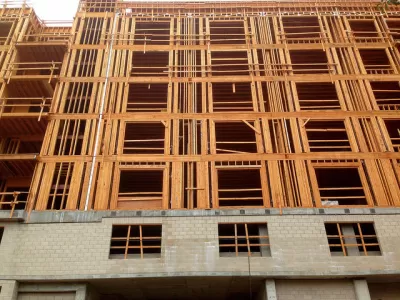California State Senator Scott Wiener argues that advocating for subsidized affordable housing isn't enough. Anyone concerned with ending the state's housing crisis needs to get behind market-rate development.

There's affordable housing, and then there's affordable housing. Scott Wiener wades into the debate: "the problem is that as much as I and others support and work to expand subsidized, income-based affordable housing, we will never — and I truly mean never — produce enough of that housing to satisfy all, or even most, of our housing needs."
In California, "luxury housing" has become a very loaded term. "Some describe all new market-rate housing as 'luxury housing,' because it's expensive. Well, of course it's expensive, since for decades we haven't built enough of it."
But the numbers don't add up when it comes to subsidized units. "Statewide, California has only 664,000 affordable, income-based rental homes for a population of about 40 million, leaving more than 1.54 million of California’s lowest income households without access to affordable housing. Putting that in context, California has grown by 3.1 million people in the past decade and 16 million people since 1980."
Wiener describes a "perfect storm of shortsighted policies and lack of political leadership has completely jacked up the cost of housing," and says that those who won't support market-rate housing are contributing to the problem. "It's not that all this housing is luxury housing — it's that we have created a world where it is a luxury to have housing at all, given public policies specifically designed to stifle housing production."
FULL STORY: Market-Rate Housing Isn’t a Bad Word, and We Won’t Solve the Housing Crisis Without It

Study: Maui’s Plan to Convert Vacation Rentals to Long-Term Housing Could Cause Nearly $1 Billion Economic Loss
The plan would reduce visitor accommodation by 25,% resulting in 1,900 jobs lost.

Alabama: Trump Terminates Settlements for Black Communities Harmed By Raw Sewage
Trump deemed the landmark civil rights agreement “illegal DEI and environmental justice policy.”

Why Should We Subsidize Public Transportation?
Many public transit agencies face financial stress due to rising costs, declining fare revenue, and declining subsidies. Transit advocates must provide a strong business case for increasing public transit funding.

Paris Bike Boom Leads to Steep Drop in Air Pollution
The French city’s air quality has improved dramatically in the past 20 years, coinciding with a growth in cycling.

Why Housing Costs More to Build in California Than in Texas
Hard costs like labor and materials combined with ‘soft’ costs such as permitting make building in the San Francisco Bay Area almost three times as costly as in Texas cities.

San Diego County Sees a Rise in Urban Coyotes
San Diego County experiences a rise in urban coyotes, as sightings become prevalent throughout its urban neighbourhoods and surrounding areas.
Urban Design for Planners 1: Software Tools
This six-course series explores essential urban design concepts using open source software and equips planners with the tools they need to participate fully in the urban design process.
Planning for Universal Design
Learn the tools for implementing Universal Design in planning regulations.
Smith Gee Studio
Alamo Area Metropolitan Planning Organization
City of Santa Clarita
Institute for Housing and Urban Development Studies (IHS)
City of Grandview
Harvard GSD Executive Education
Toledo-Lucas County Plan Commissions
Salt Lake City
NYU Wagner Graduate School of Public Service





























